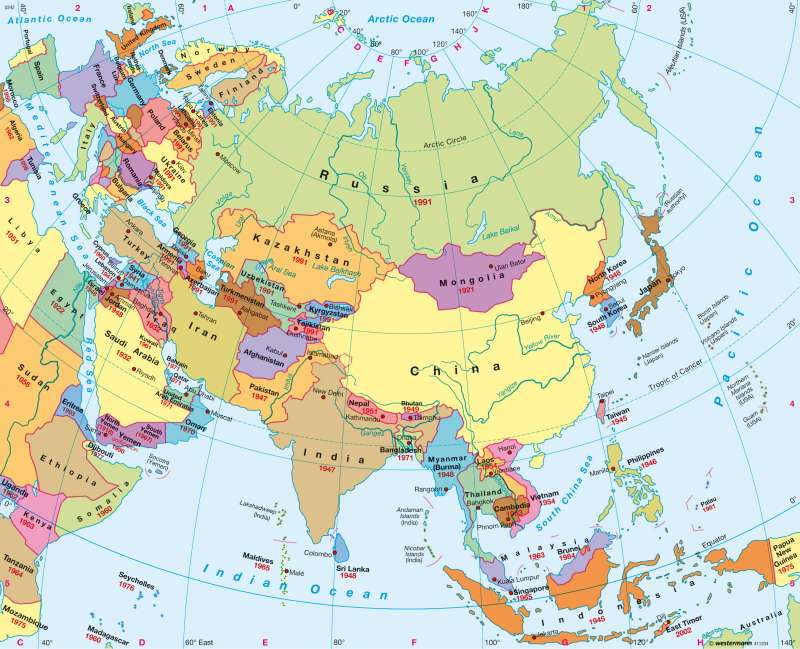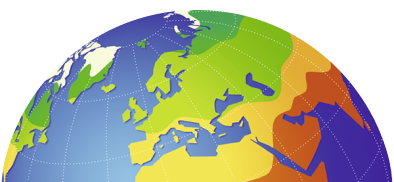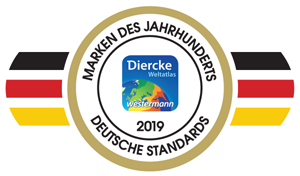Asia — Political map
Asia - Countries and history
978-3-14-100790-9 | Page 93 | Ill. 4

Information
The majority of Asian countries did not obtain their present boundaries until after the Second World War when they became independent the former colonial powers. In former British India, long-standing conflicts between Hindus and Muslims split the states of India and Pakistan in 1947. Myanmar (Burma), Indonesia, Vietnam and the Philippines, which were occupied by Japan in World War II, were also given autonomy. In 1910, the Japanese occupied Korea which was divided in to North and South Korea in 1948. Against the backdrop of the Cold War, a whole series of bloody conflicts broke out in Asia such as the Korean, Indochina and Vietnam Wars. In 1954, Indochina was divided in to the sovereign states of Laos, Cambodia and North and South Vietnam; in 1976, the reunification of Vietnam under Communist rule took place. The Communists won the Chinese civil war in 1945. The People's Republic was established in 1949 and also rose to become a great power. The political upheaval in the Soviet Union followed from 1985, then the dissolution of the USSR in 1991 and the emergence of many new states in Central Asia, the Caucasus and Eastern Europe.Asia and Europe
The contrast between the early civilisations in the Middle East, India and China were characteristic of the Asian continent in ancient times, but there were also other factors: The language, customs and traditions of the distinct nomadic peoples of the steppes of Central Asia and Arabia. Through Alexander the Great, the Roman Empire and the Byzantine Empire in Asia Minor had a close cultural relationship with Europe in ancient times. In the 7th and 8th Centuries, Arab Muslims invaded and spread Islam to South Asia. In the 13th Century, Genghis Khan and his successors conquered large parts of the continent and established the Mongol Empire, the greatest empire in world history.
In 1498, Vasco da Gama discovered a sea route to India. The Portuguese were the first to arrive there, followed by the Dutch, British and French. From that time and increasingly from 18th Century, the European colonial powers began to divide South and Southeast Asia among themselves and to establish dominance in Asia and in other regions. Spain had already occupied the Philippines since the 16th Century, Great Britain subordinated the Indian subcontinent from 1756, France acquired Indochina and the Netherlands occupied the Sunda Islands as the "Dutch East Indies. Meanwhile, developed Russia as the dominant power, with the decline of the Ottoman Empire in the northern half of Asia, mainly at the expense of the Chinese Empire. By 1900, Japan and the U.S. came in on the scene as other colonial powers. The United States wrested the Philippines from Spain in 1898 and Japan occupied Korea and Manchuria. Only a few countries such as China, Afghanistan, Iran (Persia), or Thailand have managed to retain an often restricted independance.
The emergence of new sovereign states in the 20th Century was often accompanied by serious armed conflicts. By dividing the world into the ideological divided bracket of the U.S. and the USSR, China was the second country on the Asian continent to gain the status of a world power by the mid-20th Century.
New economic power- People's Republic of China
In China 1949, there was a long-term guerrilla war to overthrow the Government of Chiang Kaishek. He fled, with about 2 million of his supporters, to the island of Taiwan where he proclaimed the National Republic of China 1950. Until 1971, this was the sole representative to the UN, although this was at a time when the People's Republic of China was out of favour with the USA. To date, Taiwan has been regarded as a renegade province by China.
From 1949, the Socialist People's Republic of China came under the rule of Mao Tse-Tung, the office of the Central People's Government introduced a nationalisation of industry and commerce and a collective agricultural production. The "Great Leap Forward" campaign which began in 1958, in an attempt to increase economic growth through political mobilisation, failed. From 1966 to 1969 the "Cultural Revolution" continued, while the "Red Guard" took ruthless action against all political opposition going on. Despite this, the PRC gradually established itself as the "third world power" and in 1971, was recognised by the UN and included as a permanent member of the Security Council. The visits of U.S. President and the German Chancellor in 1972 marked the beginning of a cautious opening to the West. After Mao's death in 1976 and the overthrow of the "Gang of Four" the PRC followed a more moderate socialist course. The democracy movement of 1989, however, was militarily defeated. The sometimes repressive and undemocratic policy faces the internal presence of a high degree of openess to a market economy. Since the beginning of the 1990's, China has increadsed openings to foreign trade, and so the country has experienced a strong economic boom. In many agricultural and industrial production sectors, the People's Republic is now an undisputed leader by international standards. The downside of the economic growth, however, is a huge army of nearly 200 million migrant workers living and working under extremely difficult conditions.
Russia and the CIS
In 1985, the election of Mikhail Gorbachev as the Secretary-General of the CPSU, led to profound political changes in the Soviet Union which in their wake greatly changed the world. The democratic reforms led to the secession of numerous non-Russian peoples, and finally to the disintegration of the USSR. In 1991, the Soviet Union was formally dissolved and formed the Russian Federation. The territories which emerged alongside it were the successor states of Kazakhstan, Uzbekistan, Turkmenistan, Tajikistan, Kyrgyzstan, Georgia, Armenia, Azerbaijan, Ukraine, Belarus, Moldova, Estonia, Latvia and Lithuania. Under the leadership of Russia, these states joined together from 1991 to form the "Commonwealth of Independent States" (CIS).
D. Bode, K. Lückemeier; Ü: C. Fleming




